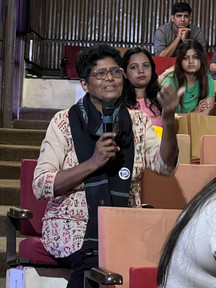
FCA National Colloquium 2023
Explorations in Gender and Space: Academic Perspectives
01- 02 April 2023 I CEE Ahmedabad
The first week of April saw participation of people from across India at the second annual colloquium of the Feminist Collective in Architecture (FCA), a voluntary organisation of architects, artists and designers working towards gender inclusion in architecture and allied fields. It was held on 1st and 2nd April, 2023 at the Centre for Environment Education (CEE) at Thaltej, Ahmedabad. While the theme of last year’s colloquium was ‘Women in Architectural Practice’, this year, the discussion forayed into ‘Explorations in Gender and Space: Academic Perspectives’. The colloquium consisted of panel and poster presentations, book discussion and a gender mapping workshop. The discussions were complemented by a photography exhibition and a curated book corner on the subject of gender and space.
As highlighted by Urvi Desai, co-founder of the collective, in her inaugural address, “The FCA National Colloquium is a safe, collaborative, and inclusive learning space for students, researchers and practitioners to express themselves and share their explorations on gender and space”. The colloquium became a platform that brought together a wide spectrum of work on gender and space from institutions across India. In her keynote address, Mumbai-based architect and academician, Neera Adarkar remarked that the Feminist Collective in Architecture is “a history in the making”, “a quiet, but powerful initiative” paving way for young feminists to talk about the patriarchal nature of the built environment. She also highlighted the need to look at this topic through an intersectional lens to empathetically understand women's struggles across all socio-economic classes, castes, religious and educational backgrounds.
Presentations encompassed a range of research on how socio-cultural norms and a patriarchal approach to city planning and infrastructure influence women’s perception and usage of domestic as well as public places. Panellists, consisting of college students, young professionals and veteran researchers, identified a range of social and physical barriers that women face at home, on streets, in public transport, at workplaces and in places of leisure, which limit their mobility and access to the city at their free will. In the panel discussion on a recently launched book edited by Madhavi Desai titled ‘Gender and the Indian city: Revisioning Design and Planning’, authors and discussants emphasised the need for more such publications, considering that there is a dearth of scholarship in this domain.
It was encouraging to see some men actively participating in the colloquium and sharing their solidarity with the notion of employing feminist thinking in design. Their recognition of gender discrimination in society and space, and their interest in becoming co-agents of transformation was heartening. Bhavin, one of the panel presenters, commented on the diversity of projects presented, highlighting a study on women’s transport from the field of economics, an unconventional inclusion to discussions in the architecture discipline.
Ujjaval Parekh, a patron member of the FCA and a panelist in the round table discussion, shared “For me, being a part of FCA has a selfish motive; through such activities, I hope to enrich my understanding of feminism and become a more thoughtful and supportive father for my children and family.” Another speaker Abhigna, a student from Hyderabad said that the Colloquium has renewed her ambition to make gender-inclusive architecture. She found the experience equally enlightening and empowering! To sum it up, the FCA colloquium was an inclusive space wherein everyone became a keen participant and learner regardless of their age, background or years of experience. Research that tries to identify gender discrimination and creative imaginations that look for alternatives in the design of our domestic and public spaces together promise to propel our cities towards a more inclusive and equitable future.











